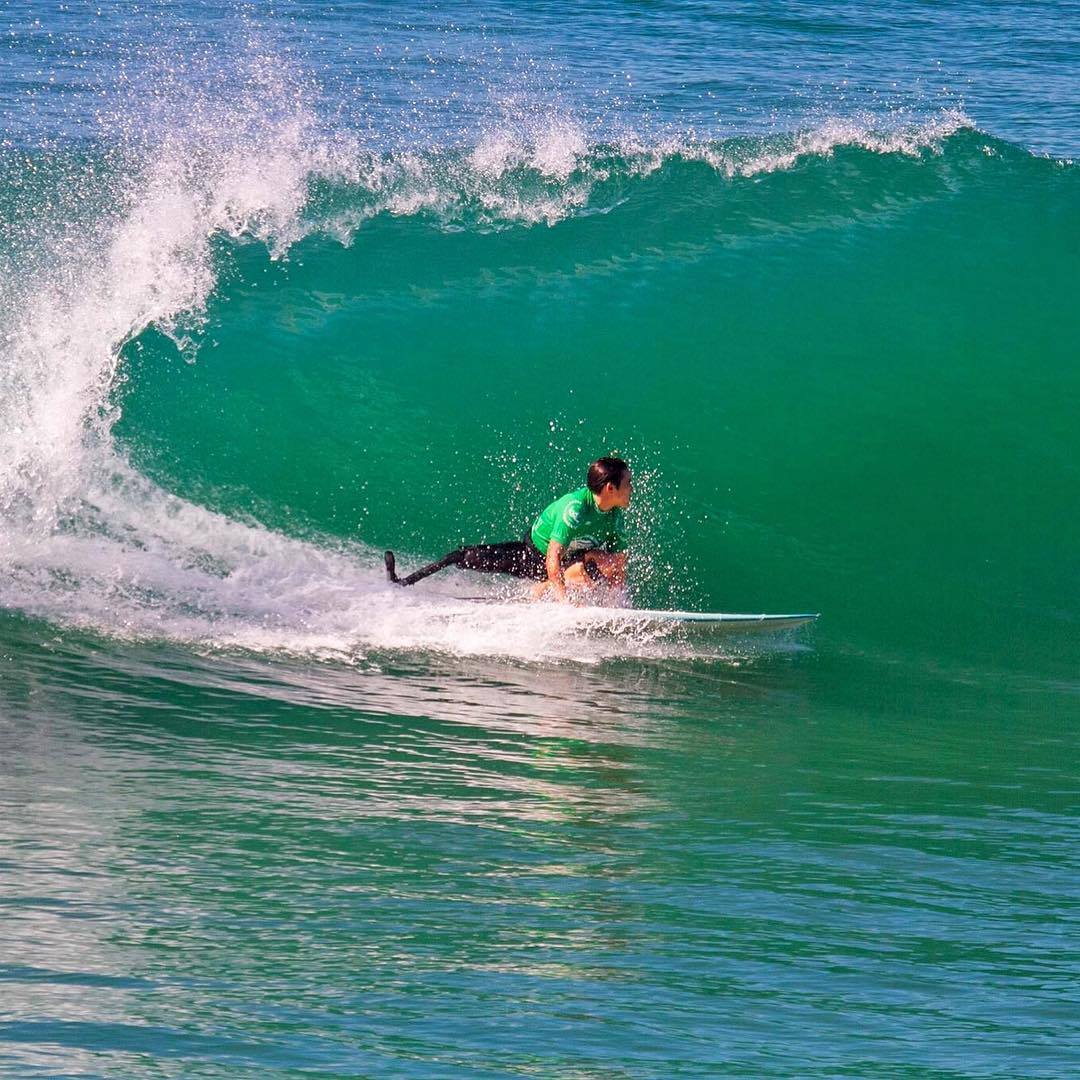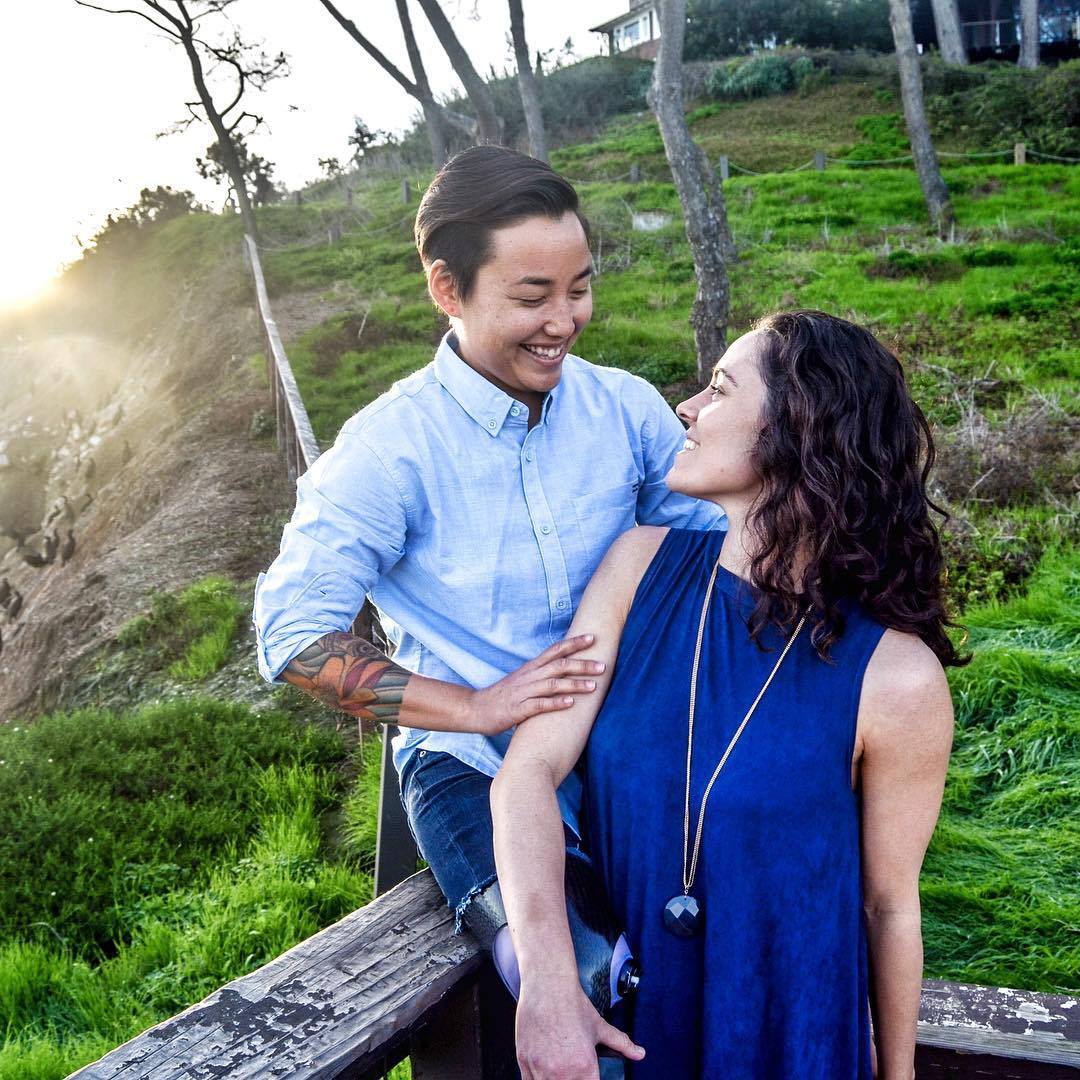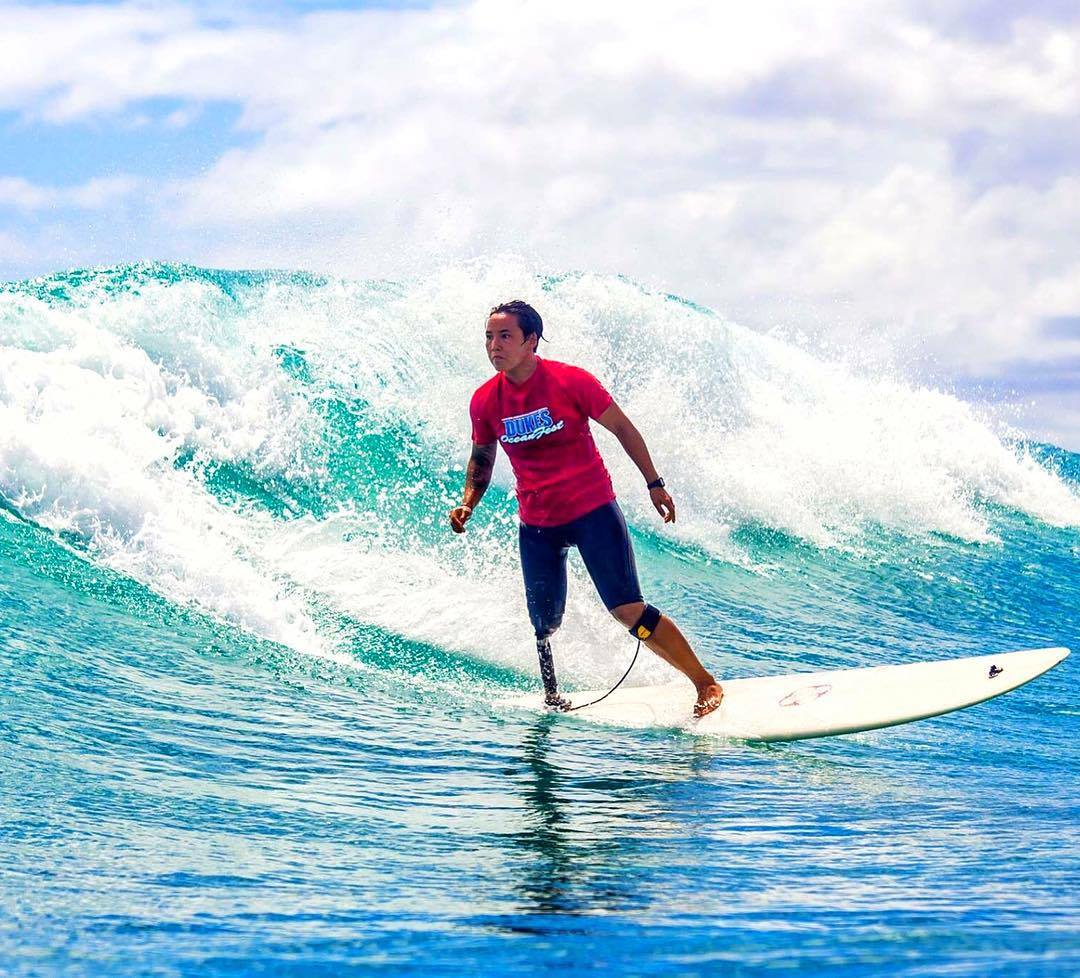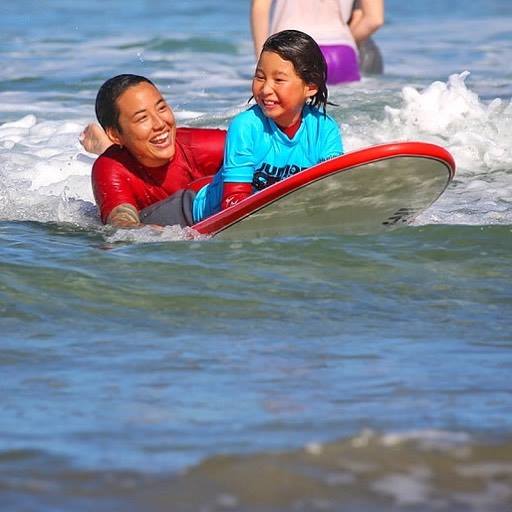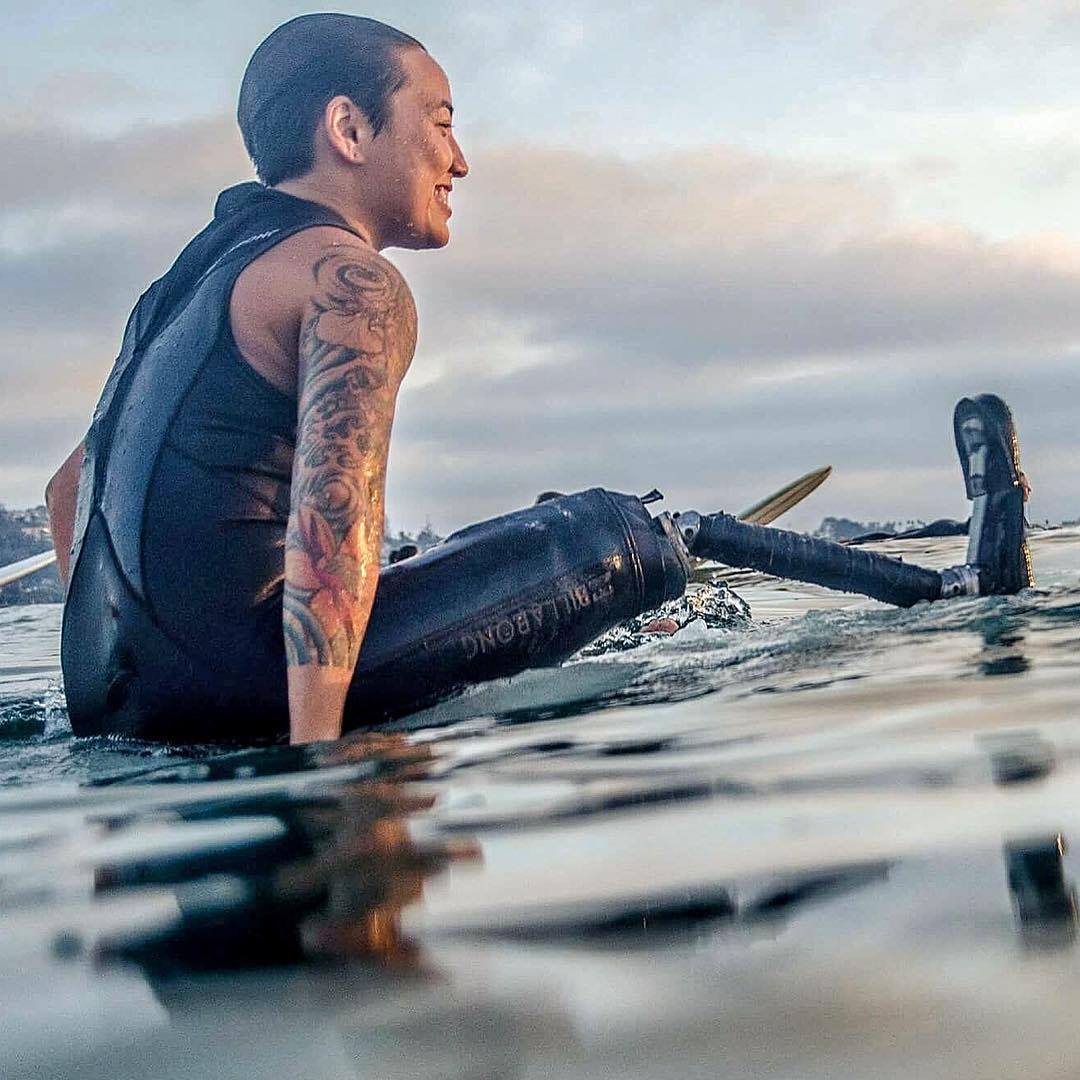Dani Burt, against all odds

@dani.burt shreds. She became a US surfing champion by beating the men in her division. She qualified as a doctor so she could work for the hospital service that supported her. For Dani is an above-the-knee Adaptive #Surfing Champion.
Growing up, Dani embraced bodyboarding and skateboarding with the raw passion of kids who need to escape their environment:"Both sports gave me a break from all the negativity that was going on around me. I was able to only think about what was in front of me: the next trick I wanted to pull, the next wave on the horizon." A motorbike accident took her over the edge: Dani woke up from a 45 day coma with acute respiratory problems and gangrene in her right knee. Like many before her, Dani contemplated suicide. Instead she chose to give it her all, competing as an adaptive #skateboarder and #snowboarder. 4 years after her accident, Dani met above-the-knee surf hero @alcinopirataoficial who inspired her to try surfing for the first time.
Ranking US N°1 and World's 7th in the standing division, Dani is looking forward to the @isasurfing World #AdaptiveSurfing Championships, opening tomorrow in #LaJolla. For the first time, she'll have the opportunity to compete against other women: "I feel there are many reasons why it took this long. Lack of encouragement, the way we portray women in sports... When people say there is a lack of women interested in surfing that that is just not true. They are there but require equal encouragement, equal opportunities and the chance to see other elite females shredding". Not only Dani gives us that, but also the courage to face life-changing moments. "My crash forced me to slow down and take a very close look at myself. It gave me the strength to aim high, to allow myself to love and be loved by someone else." A beautiful wife, a 3rd place finish at @accessurf_hawaii, 2017 seems to be Dani's year. But with the #ISAworlds starting tomorrow, there could be more in store: watch Dani and over 100 athletes from 25 countries compete for a title: link in bio☝ or tiny.cc/adaptiveworld
✒: @_laurence_b 📷: @coachpatweber @nsilance @rose.jason @usasurfing @traciegara @natty_iiice #swellbound
READ THE FULL INTERVIEW :
LB: You mentioned working hard at your sports when you were a kid to escape racism. What were the sports and how did that work for you as a way to manage those issues?
DB: I wouldn't say it was just racism that I was trying to get away from. My life growing up back east was a bit more complicated than that. Either way, I skateboarded and body boarded ever since I can remember. Both sports gave me a break from all the negativity that was going on around me. Both of these sports allowed me to be alone in my thoughts. I was able to clear my head and only think about what was in front of me: the next trick I wanted to pull, the next wave on the horizon. The ability to press the mute button on what was going on around me in my daily life is what kept me from spiraling out. I was fortunate enough to have those outlets.
LB: You said that competitive surfing was a way to showcase what is possible. Did you make a deliberate decision from that angle to switch from skate/snow to surfing to be able to get visibility quicker? Maybe I am saying Amy Purdy was just too good and you needed a different platform :D
DB: Haha! Amy Purdy is very good but if I was still competing in snowboarding, I wouldn't be competing against her anymore because we'd be classified in different divisions since she is missing her legs below her knees and I am missing my leg above my knee. With that being said, it wasn't a deliberate switch to get more visibility. It was a switch for my sanity. If you ask any waterman or woman they will tell you that there is something very special about being in the ocean. That once you know that feeling, there's no getting over it. The ocean has always been home to me and after my accident, it was the one thing I was truly missing in my life.
I didn't surf before my accident. I picked it up afterwards because my friends in San Diego were all surfers so they encouraged me to give it a go. There was no prosthesis available to allow you to go into the ocean, let alone surf so I made a surf leg from old parts with the help of my prosthetist. Then, Legendary board shaper, Donald Takayama (rest in peace) let me borrow a 9'0 Slater from his shop. The rest is history.
LB: I am still not quite realising that you have been competing in the men's division at the ISA championships and killed it. I believe this year is the first time that there is a women's stand division. Why do you think it too so long for this to happen?
DB: Yes, it is the first year that there's a women's division in my category. It's not just for standing though. I am also competing against people who kneel. Seems impossible to judge, I know, but adaptive surfing is going through a transition period and I look forward to the day they separate the two skills like other competitions have done.
I feel there's many reasons why it took this long. Lack of encouragement, lack of opportunities, the way we portray women in sports... I was stoked to hear that the Paralympic Committee said that there would have to be equal women and men competitors in order for the sport to be considered for the Paralympics otherwise I'm unsure if there would have been any sort of push to get more women in the sport. I feel people need to realize that when they say there is a lack of women interested in surfing that that is just not true. They are there but require equal encouragement, equal opportunities and the chance to see other elite females shredding. I also believe that since it's been so unequal for so long, the push for women in the sport needs to be even louder and more visible than the men to even have a chance to catch up to being equal.
LB: You had your accident when you were 20. How formative was your disability in empowering other aspects of your life, such as being out and proud (and getting the most beautiful woman, congrats btw!)
DB: Jeeze, where to begin? Looking back at myself before my crash, I really don't know how I would have got a long with my life. I'm sure I would have found happiness but the road my disability took me on has been insane. Insane in such a deep and meaningful way. I was forced to slow down and take a very close look at myself, learn how to be more vulnerable with others and find my self worth. It gave me the strength to get away from the toxicity that had surrounded me since I was a child, to aim high, go to college and receive my doctorate and to allow myself to love and be loved by someone else. Being a person with a disability is definitely not an easy but life has never been easy. It's been very empowering to see just how much I can handle and be witness to the amazing support and love from others.
Chief Storyteller at Swellbound
